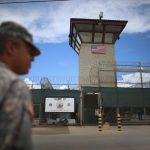This month marks the 14th anniversary of the opening of Guantánamo Bay detention center, the most visible symbol of U.S. torture and injustice around the world. President Barack Obama acknowledged this when he ordered the prison closed on his second day in office, calling it a “sad chapter in American history.”
Unfortunately, Guantánamo is still open – and so is this sad chapter.
One hundred and five men remain at the prison, most held a decade or longer without being charged with any crime. Many have been tortured and abused by the United States and its allies. All have been denied the full protection of the Geneva Conventions and the U.S. Constitution – their lives and rights forfeited to the United States’ contempt for its human rights obligations.
In the wake of the Paris terror attacks, America is once again grappling with security concerns in an intense climate of fear. An all-too-familiar rhetoric has resurged about compromising laws and values for “safety.” On Guantánamo’s anniversary, there is no better time to reflect on what policies based on fear have already cost us.
The military prison was opened in 2002 as a place to detain and interrogate terror suspects outside the protection of domestic and international law. Detainees were tortured with “enhanced interrogation techniques” such as waterboarding, sleep deprivation, prolonged isolation, sensory deprivation, and stress positions.
These techniques, developed by CIA psychologists, were calculated to bring about the complete psychological destruction of human beings and were carried out at CIA “black sites” and military prisons, including Guantánamo. The torture was monitored by physicians and psychologists, who shared medical data with interrogators to better exploit detainees.
Many victims of the CIA torture program were eventually sent to Guantánamo. And while the military no longer interrogates Guantánamo detainees, cruelty persists in the form of indefinite detention, force-feeding, and medical neglect.
Abd Al-Rahim al-Nashiri’s story is illustrative. Accused of planning the 2000 bombing of the USS Cole, al-Nashiri was tortured at several CIA black sites, including one at Guantánamo. The summary of the Senate’s 2014 report on the CIA torture program – one of the few declassified accounts of his abuse – details rectal feeding, mock execution, and threats with a gun and a drill.
Today, al-Nashiri is held in near total isolation at Guantánamo. He suffers severe, untreated psychological trauma as the result of this torture. Dr. Sondra Crosby, an independent physician who evaluated al-Nashiri, diagnosed him with complex post-traumatic stress disorder, with “somatic complaints, nightmares, hypervigilance, flashbacks, numbing, and a host of other symptoms.” The CIA accomplished its goal of reducing al-Nashiri to a state of “learned helplessness” – that is, of inflicting psychological harm so severe it produced lasting mental illness.
Al-Nashiri is the unusual Guantánamo detainee actually facing prosecution. But years of detention have taken a dire health toll on all the men:
- Tariq Ba Odah, a Yemeni detained since 2002, has been on hunger strike for years. Despite twice-daily force-feedings, he has dropped from 160 lbs to a skeletal 74 lbs.
- Tariq al Sawah, an Egyptian detained since 2002, doubled from 200 to 400 lbs, largely due to Guantánamo interrogators who used food as an instrument to exploit his psychological vulnerabilities.
- Asim Thabit Abdullah al-Khalaq, a Yemeni detained since 2002, died of chronic kidney failure six months after being resettled in Kazakhstan in 2014.
Guantánamo has been called a “psychological scar on our national values.” It has profoundly harmed the minds and bodies of detainees. It has corrupted the health professionals who enabled abuses and violated their ethical duty to “do no harm.” It has served as a propaganda tool for terrorists and undermined our counterterrorism efforts. And it has degraded our collective respect for human rights and the rule of law.
It is time for us to take responsibility for these mistakes and the people we’ve harmed. President Obama must end indefinite detention by ensuring all Guantánamo detainees are prosecuted in federal courts, or safely repatriated or resettled. Relevant federal agencies must review the Senate torture report summary, and the full report must be declassified. The Justice Department must investigate and prosecute all those responsible for torture. Finally, the United States must provide torture victims with truth, justice, reparations, and redress, including medical and psychological rehabilitation.
For this sad chapter in American history to end, there must be accountability for all the human rights violations committed in the name of national security. The discourse of fear must not distract us from the truth: the human cost of Guantánamo is borne by us all.

